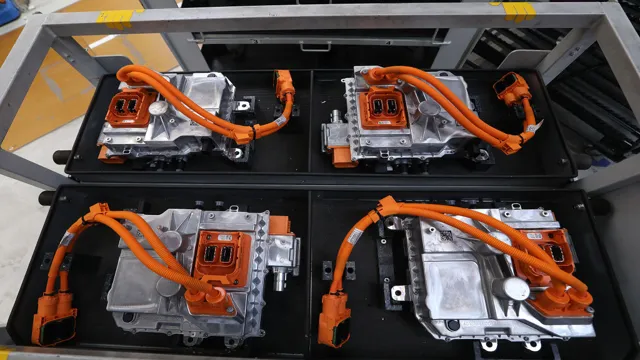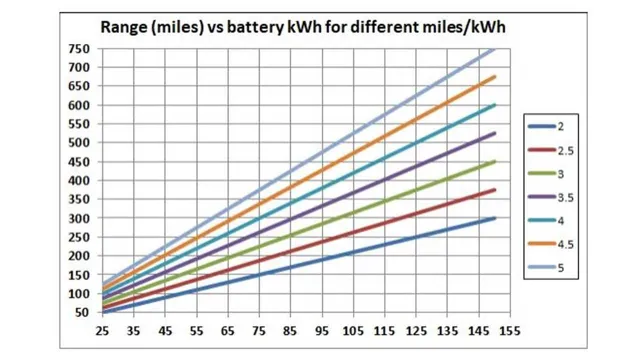Unveiling the Power and Potential of Electric Car Batteries: The Key to Sustainable Transportation
Electric cars have taken the world by storm, offering a cleaner and more sustainable mode of transportation. However, the technology behind electric cars can seem complex and confusing, particularly when it comes to the batteries that power them. In this blog post, we will explore everything you need to know about electric car batteries, from the types of batteries used to the factors that affect their lifespan.
So, if you’re curious about the inner workings of electric vehicles and want to learn more about the powerhouse at their heart, keep reading!
What Makes Electric Car Batteries Different?
When it comes to electric cars, the battery is one of the most crucial components. Unlike traditional gas-powered vehicles, electric cars rely on an entirely different type of battery called a lithium-ion battery. These batteries are much larger and more powerful than traditional car batteries, and they’re designed to be recharged numerous times before needing to be replaced.
Because of their size and power, electric car batteries can take longer to charge than traditional batteries, but they also offer longer ranges and superior performance. Additionally, electric car batteries are designed to last for many years before needing to be replaced, which can save drivers a lot of money in the long run. So if you’re considering buying an electric car, it’s important to understand the unique characteristics of these batteries and how they differ from traditional car batteries.
Long-Lasting
When it comes to electric car batteries, there are some key differences that set them apart from traditional gasoline-powered vehicles. First and foremost, electric car batteries are designed to last much longer than their gas counterparts. This is because they are made with high-density lithium-ion cells, which have a longer lifespan and can hold more energy than other types of batteries.
Additionally, electric car batteries are designed with safety in mind, with features like thermal management systems to prevent overheating and short circuits. Finally, electric car owners can enjoy the added benefit of regenerative braking, which allows the batteries to recharge while driving and significantly extends their overall lifespan. All of these features combine to make electric car batteries a durable and long-lasting choice for drivers who are looking to make the switch to a more sustainable mode of transportation.

Charge Time
Charge Time Electric car batteries are different from traditional gasoline engines for various reasons, including charge time. One of the primary concerns for electric car owners is how long it takes to charge a battery. With a traditional gasoline vehicle, refueling at a gas station only takes a few minutes.
In contrast, charging an electric car battery can take several hours. However, the amount of time it takes to charge an electric car battery depends on several factors, including the size of the battery pack, the power of the charging station, and the vehicle’s range. Some electric cars today can be charged up to 80% in just 30 minutes, while others may take longer.
Furthermore, with advancements in technology, many electric cars offer fast-charging capabilities that significantly reduce the amount of time it takes to charge a battery. As more electric cars hit the market, innovations in battery technology will undoubtedly continue to evolve, making it even faster and more convenient to charge electric cars.
Performance
Electric car batteries are different from traditional gasoline-powered vehicles in many ways. Firstly, electric car batteries are much larger and heavier than traditional car batteries. This is because they require more power to operate and store energy from regenerative braking.
Additionally, electric car batteries are designed to provide a consistent amount of power over a longer period of time, rather than providing brief bursts of energy like traditional car batteries. This makes them better suited for powering electric motors and achieving high performance. Moreover, electric car batteries are designed to be more efficient, allowing them to convert stored energy into motion with much less waste and heat.
Overall, electric car batteries are a crucial component in the success of electric cars and their future development.
Types of Electric Car Batteries
When it comes to electric cars, one of the most important components is the battery. There are several types of electric car batteries to choose from, each with its own advantages and drawbacks. One popular type is the lithium-ion battery, which is commonly found in smartphones and laptops.
They are known for their energy efficiency, fast charging capabilities, and long lifespan. However, they can be expensive compared to other types of batteries. Another type of electric car battery is the nickel-metal hydride battery, which is commonly found in hybrid cars.
They are less expensive than lithium-ion batteries but have a shorter lifespan and lower energy efficiency. Lastly, there are solid-state batteries, which are still in the developmental stages but hold potential for higher energy density and quicker charging times. Regardless of the type of battery, it’s essential to consider factors such as cost, efficiency, and lifespan when choosing an electric car.
With the right research and consideration, you can find the best electric car battery to fit your needs and lifestyle.
Lithium-Ion Batteries
When it comes to electric cars, the type of battery used is a crucial consideration. One of the most popular types of electric car batteries is lithium-ion batteries. These batteries are known for their high energy density, which means they can store a lot of energy in a small space.
This makes them perfect for electric cars, allowing them to travel long distances without the need for frequent recharging. Lithium-ion batteries also have a long lifespan and a low self-discharge rate, which means they can hold their charge for longer periods of time. Additionally, they are lightweight and compact, making them ideal for use in electric vehicles.
However, it’s worth noting that lithium-ion batteries can be expensive to manufacture and can pose a risk of thermal runaway if damaged. Despite these drawbacks, lithium-ion batteries remain a popular choice for many electric car manufacturers due to their efficiency and overall performance.
Lead-Acid Batteries
Lead-Acid Batteries One of the types of electric car batteries is the lead-acid battery, which has been around for over a century. Although less efficient than other batteries, lead-acid batteries have a relatively large capacity and can deliver high currents. They are also more affordable and widely available than other batteries, which makes them a popular choice for automotive applications.
However, they are bulkier and heavier than other alternatives and require more maintenance. Another disadvantage of lead-acid batteries is that they are not environmentally friendly as they contain lead, which is a toxic substance. Despite these drawbacks, lead-acid batteries remain a crucial component in the electric mobility industry and are still widely used in smaller electric vehicles and hybrids.
Nickel-Metal Hydride Batteries
Nickel-Metal Hydride batteries are just one of the many types of electric car batteries available today. These batteries are often used in hybrid electric cars and other smaller electric vehicles due to their compact size and improved energy density. They work by storing energy in a chemical reaction between hydrogen ions and a metal alloy within the battery, which can then be used to power the car’s electric motor.
While Nickel-Metal Hydride batteries are not as efficient as some other options, they are still a popular choice due to their affordability and reliability. Ultimately, the type of battery used in an electric car will depend on a variety of factors, including the car’s size and intended use, as well as the driver’s budget and personal preferences.
Understanding Battery Capacity and Range
Electric car batteries are a crucial component that determines the range and overall performance of an electric vehicle. The capacity of a battery, measured in kilowatt-hours (kWh), determines how much energy the battery can store and therefore how far the car can travel on a single charge. The range of an electric car depends on several factors including the capacity of the battery, driving conditions, the weight of the car, and how frequently the car is charged.
When considering the range of an electric car, it is important to note that the advertised range may not be reflective of real-world driving conditions, as driving at high speeds and frequent use of air conditioning or heater can reduce the range. With advancements in technology, the capacity of electric car batteries is increasing and their ranges are improving. As an electric car owner, it is important to understand the battery capacity and range of your vehicle to make informed decisions on when and how to charge the battery.
How Capacity is Measured
Battery capacity is a measure of the amount of energy a battery can store. It’s one of the most important factors that determines how long an electronic device can run before needing to be recharged. Battery capacity is measured in units of milliampere-hours (mAh) or watt-hours (Wh).
The higher the capacity, the longer the device can run on a single charge. For example, a smartphone with a battery capacity of 3,000 mAh can last longer than a smartphone with a battery capacity of 2,000 mAh. It’s important to note that battery capacity is only one factor that affects battery life.
Other factors such as screen brightness, network signal strength, and usage patterns can also affect battery life. So, if you’re looking for a device with a longer battery life, it’s a good idea to consider not just the battery capacity but also other factors that can affect battery life.
Factors that Affect Range
As an electric vehicle owner, understanding battery capacity and range is crucial when it comes to maximizing your driving experience. The range of an electric vehicle is impacted by various factors, including battery capacity, driving habits, weather conditions, and terrain. Battery capacity is the amount of energy a battery can store and is measured in kilowatt-hours (kWh).
The higher the battery’s capacity, the longer the range of your electric vehicle. Additionally, driving habits play a significant role in determining the vehicle’s range. Aggressive driving, frequent speeding, and hard acceleration drain the battery faster, reducing the range.
Weather conditions, especially extreme temperatures, have a considerable impact on battery performance. Higher temperatures can decrease battery life, while colder temperatures may affect the battery’s ability to provide enough voltage to the motor. Lastly, terrain affects the range of the vehicle.
Driving uphill requires more power than driving downhill, reducing the range. Overall, understanding battery capacity, driving habits, weather conditions, and terrain is essential in maximizing your electric vehicle’s range.
Maintaining and Replacing Electric Car Batteries
Electric car batteries are an innovative and crucial component of electric cars. Owning an electric car battery requires careful management, and it is essential to understand how to maintain and replace it properly. The electric car battery’s life span is usually between eight and ten years, and as it reaches the end of its life, it may not hold as much charge as before.
In this scenario, replacing the battery is the only option. Regular maintenance is also necessary to extend the life of the battery. Owners should charge the battery often and avoid overcharging, which can shorten the battery’s lifespan.
Temperature control is another crucial factor in optimizing and maintaining battery life. Extreme temperatures can cause irreversible damage to electric car batteries, so it is vital to park the car in a cool, safe spot. In conclusion, proper management and care for electric car batteries can help extend their lifespan and function.
Battery Maintenance Tips
Maintaining and replacing electric car batteries is crucial for the performance and longevity of the vehicle. To extend the life of the battery, it is important to practice good battery maintenance. One tip is to avoid overcharging the battery, which can cause damage and reduce its capacity.
Additionally, it is recommended to keep the battery at a moderate temperature and avoid exposing it to extreme heat or cold. Regularly checking the battery’s state of charge and scheduling maintenance checks with a professional can also help ensure it is functioning properly. If the battery does need to be replaced, it is important to consult with an expert and choose a high-quality replacement to ensure the best performance and efficiency for your electric car.
By properly maintaining and replacing electric car batteries, car owners can help ensure their vehicle runs smoothly and efficiently for years to come.
When to Replace Your Battery
Electric car batteries are a crucial component of your vehicle, and maintaining them properly is key to ensuring longevity and optimal performance. While the lifespan of an electric car battery varies depending on factors such as the type of battery, usage habits, and climate, there are some signs that indicate it may be time for a replacement. If you notice a significant decrease in your vehicle’s driving range, slower charging times, or a noticeable reduction in overall performance, it may be time to consider replacing the battery.
It’s important to note that regular maintenance and care can help prolong the life of your battery, such as avoiding extreme temperatures and charging your vehicle regularly. When it comes to replacing your battery, it’s best to consult with a qualified technician who can provide guidance and ensure that your new battery is properly installed and programmed for optimal performance. By staying proactive in maintaining and replacing your electric car battery, you can enjoy reliable and efficient performance over the life of your vehicle.
Conclusion: Electric Car Batteries are Changing the Game
In conclusion, electric car batteries are the key to unlocking a cleaner and more sustainable future for transportation. They may not be perfect (yet), but they’re certainly a step in the right direction. Plus, who wouldn’t want to drive a car that runs on a battery instead of a gas-guzzling engine? It’s like trading in a horse and carriage for a Ferrari.
So let’s embrace the power of electric car batteries and lead the charge towards a greener tomorrow. Because when it comes to the future of transportation, the sky’s the limit (as long as we keep our feet on the ground and our hands on the wheel).
FAQs
What are electric car batteries made of?
Electric car batteries are typically made of lithium-ion cells, which are often found in consumer electronics like smartphones and laptops.
How long does an electric car battery last?
The lifespan of an electric car battery depends on factors such as usage, temperature, and the manufacturer. On average, electric car batteries last between 8-10 years.
Can you replace an electric car battery?
Yes, it is possible to replace an electric car battery. However, it can be expensive and may not be necessary if the battery still has a decent lifespan.
How do you charge an electric car battery?
Electric car batteries can be charged using different methods, such as via a standard household outlet, a level 2 charging station, or a DC fast-charging station. The charging time and range will depend on the method used.





